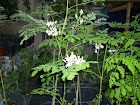Moringa leaves are a valuable addition to your pet’s diet. There are at least 5 good reasons to give your animals Moringa. Moringa leaves are a super nutritious food that contains 46 antioxidants, and 90 nutrients including high-quality protein, calcium, trace minerals, all essential amino acids, and even iron. This has been proven by a number of studies on Moringa’s nutrition.

#1:Most commercial pet foods are full of junk meat, meat by-products, GMO corn, synthetic vitamins, and are poor quality. Even better quality dog foods may be missing trace minerals and other needed nutrients. Any cooked dog food does not contain Vitamin C. Heat destroys the nutrient value of many vitamins including Vitamin C, in the food you or your dogs eat. So you need to feed your pets Moringa to provide them with some of the nutrients their commercial food lack.
Corn is in any dry dog food unless it is grain free. We feed our dogs a good quality grain-free diet formulated for older dogs’ needs. Chicken, not chicken meal is one of the first ingredients. If you are eating corn yourself, know that 90% of corn is GMO now. We have taken corn out of our diet for that reason. Corn syrup is in almost every processed food you eat. You and your pet need to eat less processed foods! The only corn eaten should be organic. If your dog chews on his paws, his dog food is probably one issue you need to examine. It can also mean he’s in pain.
#2: Our pets often develop arthritis because of poor-quality commercial dog food lacking quality nutrition. Feeding them Moringa will help feed joints and muscles to help prevent this problem. The exceptional nutrients in Moringa will feed all the different organs and body systems to help your pet remain healthier for a longer time. It is also a good idea if your dog is older and suffering from joint problems to give them glucosamine chondroitin supplements. They have chews available for dogs to make it easy.
#3: Moringa and its nutrition will help support your animal’s immune system. This is important with winter coming on. Give them Moringa as a supplement for this reason if for no other. Immune health in dogs, just like their pet parents is needed in the winter months, and when your pet begins to age. Giving them Moringa as a supplement may help them to live longer, be more agile, and with more vitality.
#4: Give your pets Moringa to boost their energy. This applies especially to older animals especially. They need some extra support. It has made a huge difference in our Aussie who is 13 and already experiencing problems in getting up. I started her on the supplements including Moringa when she started having problems getting up from a lying position. After about two weeks or so, the supplements improved that.
#5: I would suggest visiting a holistic vet before giving any pregnant dog Moringa or any other supplement just to be safe.
Moringa is a food, not an herb. In the Philippines where the Moringa trees grow in abundance, people utilize the leaves right off the trees on their property. The farmer’s markets there sell freshly harvested Moringa branches with leaves still attached, just like lettuce here.
Web MD here gives no warning for pregnant or nursing women.
Unless advised otherwise by your vet, pregnant or nursing animals should benefit from a supplement of Moringa. It will help them produce more and better quality milk. The nutrients in Moringa will give the pregnant and nursing animals an extra boost, nutrition-wise to help them during the pregnancy. Feeding them a Moringa supplement should also be of benefit while they are feeding that litter of pups or kittens. This would apply as well to pregnant farm animals such as cows, goats, and pigs.
In countries where women are starving to death, there are projects that give moringa to women to help boost their health and milk production. They give it to babies as porridge to help them survive.
Here is an excerpt from Trees of Life Journal on Moringa, which includes this paragraph below,
Nutrition
Moringa trees have been used to combat malnutrition,
especially among infants and nursing mothers. Three
non-governmental organizations in particular Trees
for Life, Church World Service, and Educational
Concerns for Hunger Organization have advocated
Moringa is natural nutrition for the tropics. Leaves
can be eaten fresh, cooked, or stored as dried powder
for many months without refrigeration, and reportedly
without loss of nutritional value. Moringa is especially
promising as a food source in the tropics.
Moringa Drugs and Lactation Database “ NCBI Bookshelf (nih.gov)
I would encourage you to visit this site on children starving in Africa. It is graphic and hard on your heart. The site is I Love Moringa, which is a site full of education on the Moringa tree, its leaves, and its value in the starvation that is occurring in those countries.
Our pets are developing some of the same diseases that humans have: obesity, arthritis, clogged arteries, and a general problem of poor nutrition. This poor nutrition leads to diseases and deaths before their time. Poor food and lack of exercise are killing our pets early.
Moringa Benefits, Side Effects, Uses, and Dosage Dr. Axe (draxe.com)
My experience giving Moringa to farm animals is that our chickens, rabbits, and goats ate the fresh leaf easily. I did not have enough to do more than give them the Moringa as a treat but they did eat the fresh readily. The Moringa powder could be mixed with their grain or coated over a piece of apple or over a piece of banana. You might try making a moringa ball, mixing its sweet grain with a bit of molasses and Moringa powder. You might have to get creative on this.

Our cats would not eat the dried Moringa in their food but would eat the leaves off my seedlings if I left them unattended. It is easy to grow the seedlings and let them eat them like cat grass. Note, when the cats eat all the leaves off of a small seedling, it may kill the seedling. You would have to keep sprouting seeds and growing a fresh crop of baby Moringa trees.
Our dogs will eat the powder mixed with their regular food. If you have a picky eater like some of the small dogs, I would mash it in with a bit of canned dog food and try that. If they are on a raw food diet, mix it in with fresh meat. Again, start with just a bit to see how they respond. If you add too much, they might refuse to eat the meat.
I would suggest starting out with just a smidgen, then work up to 1/8 of a teaspoon over a few days to judge how they do. Give that dose to them for about a week or so, then increase it to 1/4 tsp. This is food, not a herb or drug, so you may not notice a difference for a while. I would give it a three months trial at least unless they show an allergy to it. People or dogs can be allergic to any food in some cases.
I hope this gives you the answers to why both you and your pets need to supplement with Moringa. Please go to the links, (educational only) to learn more about Moringa for you and your pets. It is one of the supplements we use every day in our smoothies.
Cathryn Freer, the Herbladyisin
Note, I began giving my animals Moringa when we grew our own trees and had a business doing so. We don’t have that business at this point but we still take Moringa daily and give it to our animals. I believe in Moringa and we have personal experience with giving Moringa leaves to farm animals. In TN we had chickens, rabbits, and a goat or two for the whole 5 years we lived there. The pictures showing Moringa trees growing are personal pictures taken during that time period.